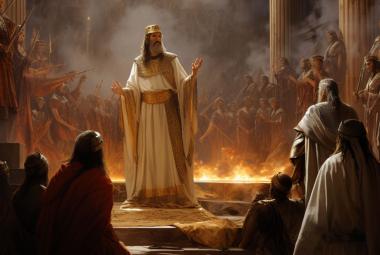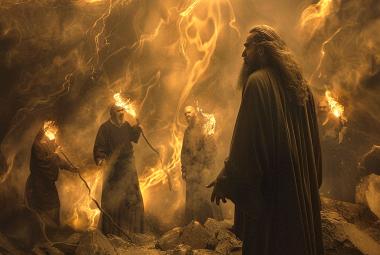”For I know the plans that I have for you…” [1]
During my career of over three decades as a High School (Secondary) Mathematics teacher in the public school system in New York State, I initiated and implemented countless changes to the programs delivered to my students. Also, when I spoke at the KI 2014 Strategic Perspectives Conference in Idaho, I introduced what I described as the “irreducible complexity”[2] of education — curriculum, pedagogy, and assessment. Briefly:
- Curriculum refers to the CONTENT that the student learns
- Pedagogy refers to the METHODS through which the student learns
- Assessment refers to the ACTIVITIES used to determine what the student learned
When I was a teacher, I taught four curricula programs and; adjusted my teaching methods based on my growing experience and numerous professional development and continuing education programs. Also, I broadened the testing program to include a wide variety of opportunities for students to demonstrate their knowledge, and it was consistently being upgraded to meet the differing needs of the students. It is a known fact in education that no educational program stagnates and still succeeds.
Our Committee
This professional perspective served as a major foundation for the committee, which is now called the Koinonia Institute Advisory Board (“KIAB”). It first began as a conversation during the summer of 2015. Our formal mandate was to perfect and propose recommendations addressing the Koinonia Institute (“KI”) program as its first decade came to an end. Beginning in the mid–2000’s, KI staff brought into reality an ambitious vision for an on-line member education, built primarily on Dr. Missler’s teachings, and the now familiar three-track structure — Berean[3], Issachar[4], and Koinonos[5]. I relied on the familiar use of an “apple” representing education and described our mandate as “shining up the KI apple.” With so much right about KI, it was a matter of adopting and adapting KI for its second decade, using the latest technology and the lessons learned from 10 years of courses, questions, and input from individuals who had earned medallions.
Andragogy
One of the early decisions the KIAB made relied on the research of American educator Malcolm Knowles. He posited that andragogy[6] is a necessary distinction from pedagogy[7] when educating adults. Since most KI members are adults, Knowles’ research and position became important.
Knowles’ theory can be stated with six assumptions related to motivation of adult learning:
- Need to know: Adults need to know the reason for learning something.
- Foundation: Experience (including error) provides the basis for learning activities.
- Self-direction: Adults need to be responsible for their decisions on education.
- Readiness: Adults are most interested in learning subjects having immediate relevance to their work and/or personal lives.
- Orientation: Adult learning is problem-centered rather than content-oriented.
- Motivation: Adults respond better to internal versus external motivators.[8]
Trajectory
The KIAB though with progressing along the three tracks of Bronze, Silver and Gold, KI needed an outcome statement. A college student declares a major that focuses the trajectory and density of course selections while still taking coursework from a variety of disciplines. In the same way, KI students needed to discover the “major” to which God was calling. You already realize that the college major is analogous to the “calling” in ministry. KI (re-)embraced its opportunity to “equip the saints for the work of THEIR ministries.”[9] Dr. Missler, on countless occasions, has said words to the effect, “We at KI would never presume to know what your calling may be. We want to help you prepare for whatever God is calling you to.”
Changes
After months of conversations and meetings during which our new understanding of “andragogy” and our fresh commitment to “equipping,” the KIAB hashed out recommendations and started implementing them to turn the “agreed upon” commitments into concrete changes in the KI program. What follows is an abridged summary of some key changes over the past year. They have been divided into the three domains of any educational program:
Curriculum
- Relying on existing Koinonia House (“KH”) products as well as producing some new ones, KI introduced new course content and design. The Issachar track expanded from its previous emphasis on prophecy and moved toward realization of one’s ministry through critical thinking and discernment, among other aspects.
- K-credits took on a new value as they became, to some extent, a measure of the progress made by the member toward identifying and embracing the ministry to which God was calling him/her.
- Some criteria have been “tweaked” to fit the needs of the students. For example, KI is piloting with one member who is seeking a Gold Medallion based on non-Koinonia House products. For this individual, the ministry to which God is calling him is one in which there is no specific KH material or KI coursework available.
- Work is being done to introduce a “Journal” requirement that will serve as an opportunity to complete KI requirements while creating a record of God’s work in the member’s life, regarding the ministry calling and opportunity.
Andragogy
- KI members enjoy greater flexibility in course selection, and ultimately, options.
- The KWL[10] course design has been introduced and it relies on the KWL[11] assessment as its primary student activity. KWL is consistent with the six assumptions of andragogy.
- We plan to introduce an SQ3R[12] course design that relies on the SQ3R[13] method for reading a document. This creates an opportunity to develop courses based on books and other documents. As students propose programs based on non-Koinonia House products, we will have the capacity to adapt this course, and include current books in the Koinonia House listings.
Assessment
Along with the aforementioned assessments — KWL and SQ3R — the KIAB decided to eliminate the Final Exam from future courses.[14] Final exams serve an academic purpose and, with a change in trajectory to the goal of equipping the saints for the work of the ministry, this purpose became less of a priority. The Ministry Journal and the KWL activities provide ample opportunities for the adult learner to reflect on learning. Also, there is an ongoing discussion as to how to make the forums into more robust discussion opportunities for members.
Small Groups
In mid–2016, KI introduced its Learn the Bible in 24 Hours – Small Group Initiative. This continues to introduce prospective members to the KI opportunity while creating person-to-person fellowship. It has long been an ambition of this author that “KI is not only in your computer but also in your community.” And I am available to attend any virtual Small Group to which I am invited. I would like to extend a “Thank You” to Dave and his small group for recently including me in their get -together!
This is a summary and a sampling of the plans we have for 2017.
Notes:
- Think Jeremiah 29:11 ↩
- Adapted from Michael Behe’s 1996 book Darwin’s Black Box ↩
- Acts 17:11 ↩
- 1 Chronicles 12:32 ↩
- Exodus 20:7 ↩
- Andragogy definition: The method and practice of teaching adult learners; adult education. ↩
- Pedagogy definition: The method and practice of teaching, especially as an academic subject or theoretical concept. ↩
- Adapted from https://en.wikipedia.org/wiki/Andragogy ↩
- Ephesians 4:12 ↩
- The letters KWL are an acronym, for what students, in the course of a lesson, already know, want to know, and ultimately learn. ↩
- For more information on KWL assessment, go to: https://en.wikipedia.org/wiki/KWL_table ↩
- The letters SQ3R are an acronym: Survey, Question, Read Recite & Review ↩
- For more information on SQ3R, go to: https://en.wikipedia.org/wiki/SQ3R ↩
- For more information, read the article available on your member dashboard titled, “Say Goodbye to Final Exams” ↩





